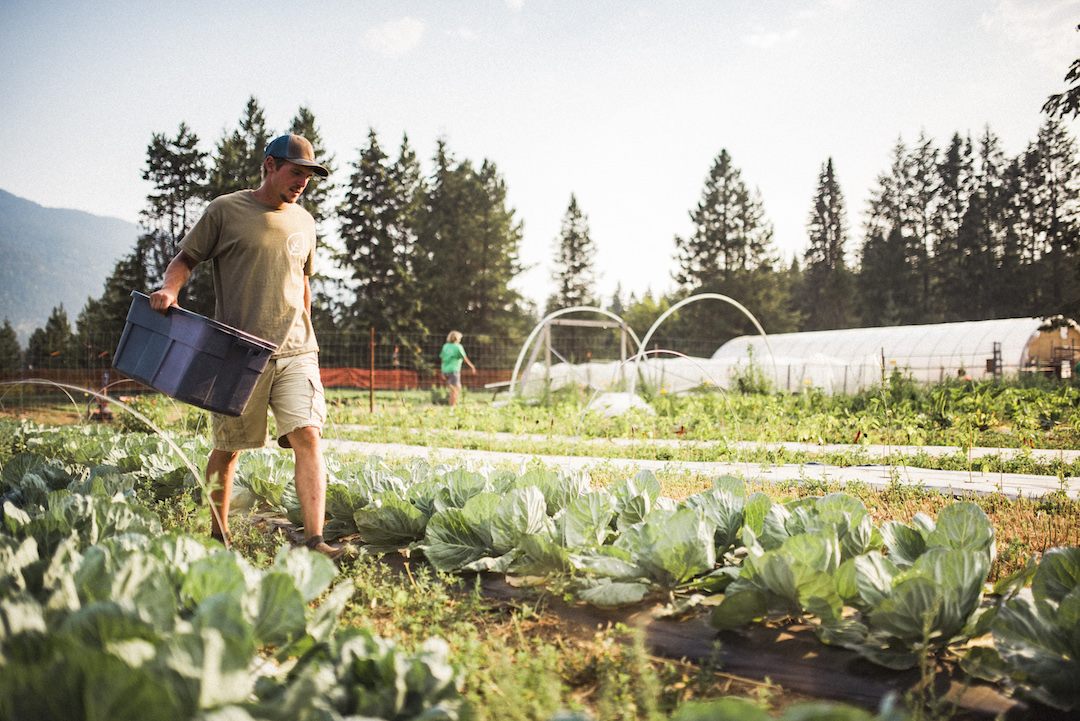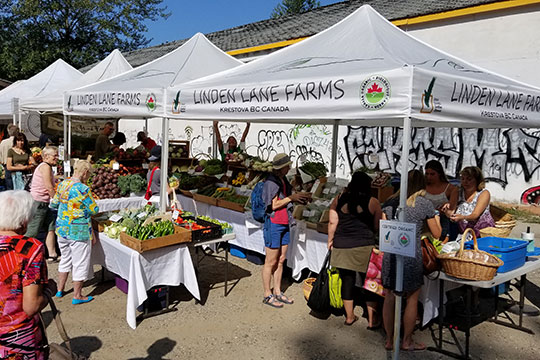
Making it work
Matthew Carr finds the passion and drive to grow his farm year by year.
By Ashleigh MatternLinden Lane Farms grows around 150 types of horticultural crops with at least two cultivars of each. This year, they have 30 types of onions—it’s a trial to see which ones they want to keep growing into the future. They’re looking into planting kiwis, grapes and haskaps, and they grow things you won’t typically find in other farms in their region, like okra, ginger and sweet potatoes.
“If we’re not trying to innovate every single year, we're not going to keep growing the farm,” said owner Matthew Carr, who graduated from the College of Agriculture and Bioresources this past spring. “If people tell me we can’t do it, I like to prove them wrong.”
Carr’s interest in farming was first sparked in his Grade 11 biology class. He built a backyard nursery at his house and kept expanding it until he had thousands of plants. Eventually, he moved the operation to his grandparents’ farm and started working in the family’s 100 by 100-foot garden.
Running his nursery and the garden part-time and not knowing much about commercial farming, he was left with 1,000 pounds of tomatoes that first year. That’s when he and his father sat down to talk about what he would need to do to start a business.
Hands-on experience
For the first few years, he was only at the farm part-time. After high school, Carr played junior hockey with the Fernie Ghostriders, the Langley Rivermen, the Trail Smoke Eaters, and the Melville Millionaires from 2011-15.
And in those early days, it wasn’t clear to him that getting a post-secondary education would be necessary for operating a small-scale farm. “I was already running the farm,” he said. “Was school worth my time?”
Attending university would take Carr away from the farm again, but his parents encouraged him to go.
“They did everything in their power to make it work here at the farm. Without their time, effort and sacrifices, it wouldn’t have been possible to keep the farm business running.”
That hands-on experience did help him better understand the academic work but he said going to university also taught him applied research, how to understand the literature, how to access funding, and opportunities to expand his network.
“It’s going to accelerate our farm past everyone else in our region.”
He worked hard at university, completing a BSc in agriculture with a major in horticulture science and a minor in soil science with great distinction, and ended up receiving the Sask. Horticultural Association Graduation Award.
Bootstrapping the business

Carr didn’t want to juggle armloads of debt. From the beginning, he’s only expanded each year as much as the business can afford.
The land was a high school graduation gift from his grandparents. He pays them a stipend to cover power and water costs. The original gift was an acre and has since expanded almost every year on his grandparents’ 150-acre farm.
“Every year, I asked, ‘Can I cut down a few more trees and expand this field?’ It’s been, ‘Can I afford another roll of fencing?’”
His farm is run as a community-supported agriculture (CSA) operation where community members buy upfront subscriptions for the season’s production. This helps him manage finances because he doesn’t have to max out his credit cards at the start of the season, which is immensely valuable for a student after two semesters of full class loads.
The CSA also gives him a sense of connection to the community.
“We’ve been running a CSA for the last four seasons, and there are a couple of members who have been buying for the last few years,” he said. “I meet them and their kids every single week and I like knowing the food is feeding them for the entire season. They’re more like family now…. I see these children growing up on stuff I grew.”
Linden Lane Farms is also a tool guardian for the Kootenay Local Agricultural Society (KLAS)—they store and rent out tools on behalf of KLAS, which gives them the ability to use the tools for free, including BCS tractors, chippers, mowers and pressure washers.
Being tool guardians is a volunteer position, one of several community outreach efforts Carr supports. The farm donates produce to the women’s shelter and food banks, giving away items that have a blemish but are still of nutritional value. And every year they grow special pink and blue pumpkins as a fundraiser for B.C. children and their families battling through cancer in memory of a close childhood friend who passed away from an extremely rare cancer just after high school. They’ve donated about $7,000 to date.
Looking to the future
Today, Linden Lane Farms supplies about 50 different fruiting plants in their nursery and grows four acres of vegetables with an additional half-acre experimental orchard for small fruits and berries. They’re certified organic, and they supply their organic produce to weekly farmer’s markets, to their CSA subscribers and into wholesale outlets. It’s a family operation—his grandparents, parents, and even his sister and girlfriend are involved—but they also have three full-time employees plus part-time employees during the peak of the season.
Building Linden Lane Farms to what it is today hasn’t been easy, Carr said.
“The first couple of years, I paid myself pennies per hour, and I still pay myself dollars per hour, but I love what I do and at the end of the day, I push through it.”
He has the passion and the drive to grow the business. His goal is to have 10 acres for vegetables—five in production, five in cover crop—and he has plans for a tools, tech and consulting company that focuses on small-scale horticulture clients as well as being a professional agrologist.
His university degree opened up new possibilities for him, and now that he’s at the farm full-time, the sky's the limit.
From Agknowledge, Fall 2019.

